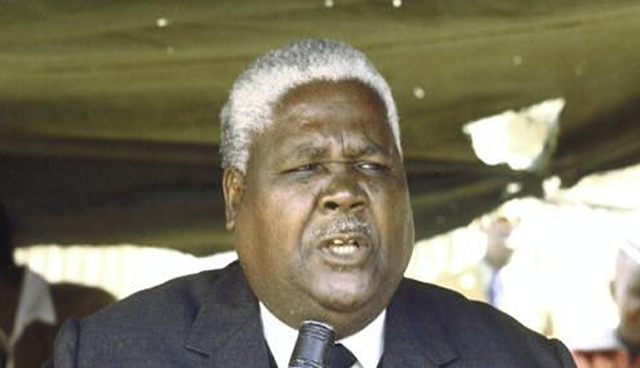Remembering Father Zimbabwe: On this day, a giant was born

Christopher Charamba Political Writer
Well, it’s not official yet but today, June 19, marks the birthday of Father Zimbabwe, the late Vice President Joshua Nkomo who was born on this day in 1917.
He died on July 1, 1999, leaving behind a rich legacy of nationalist struggle, peace and unity in Zimbabwe.
He was not called Father Zimbabwe for nothing.
And when he was befittingly laid to rest at the National Heroes Acre on July 5, a record crowd turned out at the national shrine to pay their last respects to the great man.
Little wonder then that the days of his birth and demise carry almost equal weight. His journey to becoming a national icon began in some backwater village (called Semokwe) in Kezi District, Matabeleland South.
He was the third born child in a family of eight.
His father Thomas Nyongolo Letswansto Nkomo was a teacher and lay preacher who was trained and worked for the London Missionary Service.
In his autobiography, “The Story of My Life”, Dr Joshua Nkomo describes himself as a mother’s boy; writing about the very close relationship with his mother, a cook who like his father also worked for the LMS.
“I could not keep up with other children and kept running back to my mother. I adored her; I was a mother’s boy. My weakness made me backward in our games and the sport of stick fighting. . . Even when I went to school and found myself coming first in my classes, from Standard One to Standard Six, I felt the other boys were better than me.”
Having completed his primary education, Nkomo went on to take a carpentry course at the Tsholotsho Government Industrial School.
After obtaining the qualification he proceeded to work as a schoolteacher, specialising in carpentry at Manyame School in Kezi.
In 1942 at age 25, Nkomo was eager to advance his qualifications and travelled to Durban, South Africa where he enrolled at Adams College. On the journey there by train he met Enoch Dumbutshena and Herbert Chitepo; Dumbutshena would later be influential in Nkomo’s entry into politics.
The late vice president would leave Adams College and enrol at the Jan H. Hofmeyr School of Social Work from where he would eventually receive a BA Degree in Economics and Social Science in 1952. On October 1, 1949, Dr Nkomo married Johanna MaFuyana. Having returned to Rhodesia that same year he worked at the Rhodesia Railways in Bulawayo as a social welfare officer.
His political career began when he became a trade unionist for black railway workers.
Nkomo was appalled by the conditions that black workers were subjected to and would eventually rise to the leadership as secretary of the Railway Workers Union in 1951.
Nkomo had met Nelson Mandela and other nationalist leaders while in South Africa and was influenced by their movement and ideologies. His popularity as a trade unionist grew and in 1952 he was elected president of the Southern Rhodesia African National Congress and enterprisingly used his railway pass to mobilise people across the country. The ANC was largely Bulawayo-based. However, Nkomo managed to garner much attention of the colonial government and was invited to the London Conference on the proposed Federation of the two Rhodesias and Nyasaland along with Drs Kenneth Kaunda of Northern Rhodesia and Hastings Kamuzu Banda of Nyasaland.
Dr Nkomo would eventually leave his job at the railway and in 1954 to start his business as an insurance agent. Three years later in 1957 the Rhodesian Sunday Mail reported that he was the first African estate agent and auctioneer to hold a first auction.
In 1953 the Federation came into being and the ANC was weakened by its presence. Nkomo sought allies in the City Youth League later the National Youth League which was run by Cdes James Chikerema, George Nyandoro and Edison Sithole. In 1956 the City Youth League had managed to organise successful boycotts in Harare and on September 12, 1957 the two organisations merged to form the Southern Rhodesia African National Congress (SRANC).
The date chosen for the formation of the party was significant, being the 67th Anniversary of Occupation Day, a holiday celebrated by the white settler population. Having proved himself a strong organiser and powerful negotiator, Dr Nkomo was inaugurated president with Cde James Chikerema his vice-president.
The SRANC was able to attract a mass following nationwide before its banning in 1959 though it had relative successes in its two year existence.
Cde Nkomo for example successfully suspended the Land Husbandry Act and openly condemned the bill in a public statement saying:
He said: “Any act whose effects undermine the security of our small land rights, dispossess us of our little wealth in the form of cattle, disperse us from our ancestral homes in the reserves and reduce us to the status of vagabonds and as a source of cheap labour for the farmers, miners, and industrialists — such an Act will turn the African People against society to the detriment of the peace and progress of this country.”
The SRANC was banned in 1959 and 500 of its members were detained. Cde Nkomo was in Egypt at the time and remained abroad for 18 months fearing arrest if he returned to Southern Rhodesia. He eventually returned in 1960 and founded the National Democratic Party as president along with other nationalists Leopold Takawira, Morton Malinga, Ndabaningi Sithole and Robert Mugabe.
In 1961 an NDP delegation led by Dr Nkomo attended the Southern Rhodesia Constitutional Conference chaired by Sir Edgar Whitehead the Prime Minister at the time. Rejecting the plans proposed to them, Nkomo led a boycott of the conference and as tensions rose the government banned the NDP in December of that year.
This did not deter Cde Nkomo or his nationalist comrades as 10 days after the banning they launched the Zimbabwe African People’s Union with the same structures. In September 1962 Zapu was also banned and its leaders detained or placed under travel restrictions.
Dr Nkomo was in Zambia at the time and wanted to react by forming a government in exile in an attempt to garner international support and put pressure on the white minority government. This idea was not supported by Ndabaningi Sithole and Enoch Dumbutshena and was the beginning of ideological differences that would cause a split.
Between 1962 and 1963 Cde Nkomo spent time detained and restricted to his home in Kezi. He travelled to New York in 1963 to address the UN Committee and in his time away the other leaders of the nationalist movement moved to oust him.
He then launched the People’s Caretaker Council (PCC) while Ndabaningi Sithole became the founding president of Zimbabwe African Nationalist Union in August 1963.
In April 1964 Nkomo was arrested and detained at Gonakudzingwa Restriction Camp with fellow nationalist leaders Cdes Ndabaningi Sithole, Edgar Tekere, Enos Nkala, Maurice Nyagumbo and Robert Mugabe, until 1974, when they were released due to pressure from South African Prime Minister B.J. Vorster. About his imprisonment Dr Nkomo said: “I would be silly to get anything short of majority rule after suffering all those years.”
Following release from prison, he went to Zambia to continue opposing the Rhodesian government through the dual processes of armed resistance and negotiation. Zapu’s armed wing Zimbabwe People’s Revolutionary Army was dedicated to both guerrilla warfare and conventional warfare.
In 1976 Zapu and Zanu would join together as the Patriotic Front Alliance against the Rhodesian forces. Alongside Cde Robert Mugabe, Dr Nkomo was part of the delegation that attended the Lancaster House negotiations and signed the agreement on December 21, 1979 that predated Zimbabwe’s Independence.
During the elections the Patriotic Front disbanded and Cde Nkomo’s Zapu would win 20 votes and Dr Nkomo declined the ceremonial post of president but would serve as Minister of Home Affairs in Zimbabwe’s first independent government.
His time in government ended in 1982 when Zimbabwe entered a period of civil unrest in the Midlands and Matabeleland provinces known as Gukurahundi. During this period Dr Nkomo spent some time in exile in 1984 but returned in 1985 to contest in the general election where he won the parliamentary seat for Magwegwe.
Dr Nkomo’s Zapu and Cde Mugabe’s Zanu would merge once again to form Zanu-PF at the signing of the Unity Accord on December 22, 1987 which saw the end of the civil unrest and brought unity to the people of Zimbabwe.
As part of the agreement, Dr Nkomo was appointed to the position of vice president and served in that post until the time of his death.
Cde Nkomo was buried at the National Heroes Acre on July 5, 1999 where an estimated 100 000 mourners were gathered.
We call him Father Zimbabwe.
His legacy lives forever.











Comments